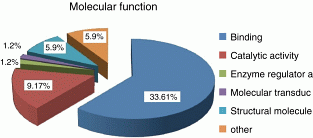ICEECE2012 Poster Presentations Male Reproduction (63 abstracts)
Effect of testosterone on seminal proteome in male hypogonadism
D. Milardi 1 , G. Grande 1 , F. Vincenzoni 1 , A. Giampietro 1 , A. Bianchi 1 , I. Messana 2 , A. Pontecorvi 1 , L De Marinis 1 , M. Castagnola 1 & R. Marana 1
1Università Cattolica del S. Cuore, Rome, Italy; 2Università di Cagliari, Cagliari, Italy.
Seminal plasma (SP) contains proteins secreted by testis, epididymis and male accessory glands, involved in the successful fertilization of the oocyte. The function of epididymis, prostate and seminal vesicles are dependent upon the presence of androgenic stimuli.
To investigate the role of testosterone in the modulation of the proteomic pattern in SP, we analyzed human SP proteome comparing the panel of common seminal proteins in five fertile normogonadal males with the proteome by five patients with severe hypogonadism. In patients and control hormonal assays and standard semen analysis were performed; proteomic analysis was performed by an Ultimate 3000 Nano/micro-HPLC apparatus equipped with an FLM-3000-Flow manager module, and coupled with an LTQ Orbitrap XL hybrid mass spectrometer. In addition, GO annotation analysis was performed in the panel of androgen-dependent proteins.
88 to 1529 unique proteins were identified per individual subject sample. 83 proteins were present in all samples of normogonadal men, while 50 of these 83 proteins were absent in all hypogonadal patients. Some of these proteins may be involved in male fertility, such as ubiquitin carboxyl-terminal hydrolases 36, the olfactory receptor 5R1, the human cathelicidin antimicrobial peptide (hCAP18), complement factor H and spindlin1. GO annotation analysis (Figure 1: molecular function) provided further information to clarify which molecular function and biological process are mainly affected by androgen deficiency.

This is the first study that used a proteomic approach to offer a complete description of the proteic panel in severe male hypogonadism, indicating possible physiological targets for testosterone action, which might represent indicators of androgen-mediated protein synthesis at cellular level. Furhermore, the finding of the absence of seminal proteins involved in fertility in hypogonadal patients may explain the association between male hypogonadism and infertility.
Declaration of interest: The authors declare that there is no conflict of interest that could be perceived as prejudicing the impartiality of the research project.
Funding: This research did not receive any specific grant from any funding agency in the public, commercial or not-for-profit sector.
 }
}



